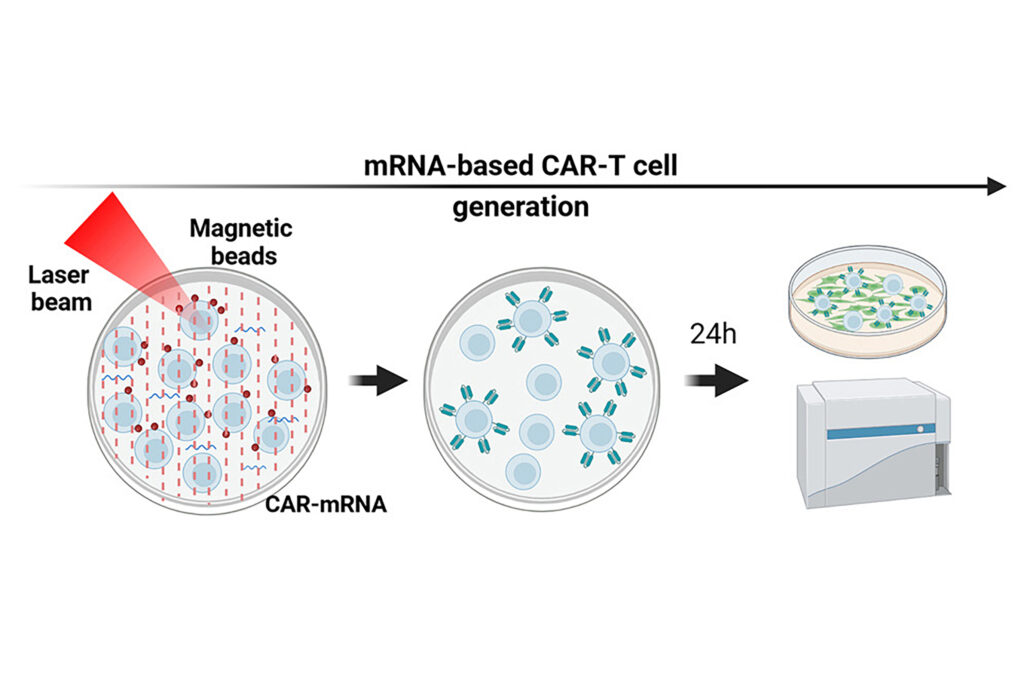Limula and University of Geneva publish a new method for non-viral generation of mRNA CAR-T

Graphical representation of the mRNA-based CAR-T cell generation process using magnetic bead-sensitized optoporation Credit: Maldonado-Pérez et al. (2025).
- A novel approach leveraging magnetic beads as photosensitizers to facilitate optoporation offers alternative cargo deliver method.
- Approach uses light-induced transient permeabilization of the cell membrane, with reduced stress on cells, preserving viability and functionality.
- By repurposing commonly used reagents, this technique integrates seamlessly into existing workflows, potentially simplifying CAR-T therapy production.
Lausanne, Switzerland, March 16, 2025 – Limula, a life science tools company specializing in automated Cell and Gene Therapy manufacturing solutions, has announced the publication of a peer reviewed article in Cell Press journal Molecular Therapy – Methods & Clinical Development. Entitled Magnetic bead-sensitized optoporation coupled with antibodies-based activation for mRNA CAR-T cell manufacturing, the report describes the development of an innovative method for non-viral gene transfer. It is the result of a long-standing collaboration between the Limula team and Prof. Denis Migliorini from the University of Geneva.
The introduction of synthetic genetic material into human primary cells is a key step in the production of CAR-T cells and other advanced therapy medicinal products (ATMPs). The vast majority of approved ATMPs rely on stable genetic modifications of patients’ cells using viruses that randomly integrate an exogenous sequence into the genome. More recently, therapies that rely on electroporation have also received marketing authorisation.
The innovative approach proposed by Limula and their collaborators is based on optoporation, a method that uses high-intensity laser to tigger transient permeabilization of the cell membrane. The resulting tiny holes allow molecular payloads, such as mRNA or CRISPR proteins, to enter the cells. The effect was previously shown to be ehanced by the addition of photosensitizers that efficiently absorb light and convert the energy into different phenomena that generate holes in the cell membrane.
Harnessing light for intracellular cargo delivery is not entirely new. Although optoporation using gold nanoparticles has demonstrated potential in the past, the work described in the scientific article demonstrates for the first time that the process can be efficiently catalysed by magnetic particles routinely used in cell therapy manufacturing.
The main contributor to the study, Dr. Noelia Maldonado-Pérez, says: “It is very satisfying to share the outcome of this project with the broader cell therapy community. The discovery that common cell activation reagents could be repurposed to catalyse the introduction of genetic material into human cells is very exciting.”
Cell activation is one of the critical steps of CAR-T cell therapy manufacturing, often immediately followed by a gene transfer step. Some challenges remain in the application of the method to the production of clinical-grade advanced therapy products, but the possibility to sequence two different unit operations without the need for additional reagents could open avenues for streamlined production methods.
Prof. Denis Migliorini adds: “We believe magnetic bead-sensitized optoporation represents an interesting addition to the toolbox available to cell therapy developers.”
About Limula
Limula SA is a life science platform technology company based in Lausanne, Switzerland, dedicated to transforming the manufacturing of Cell & Gene Therapies. Their mission is to accelerate the development and commercialisation of new advanced therapies through an automated, on-demand, and scalable manufacturing solution. Limula’s proprietary platform integrates all functionalities into a single device, empowering therapeutics developers to bring life-saving treatments to patients more efficiently. Prof. Migliorini, who was a co-author and principal investigator of the study, is a member of the Strategic Advisory Board of Limula since 2023.
Contact Details
Luc Henry, DPhil
media@limula.ch
www.limula.ch